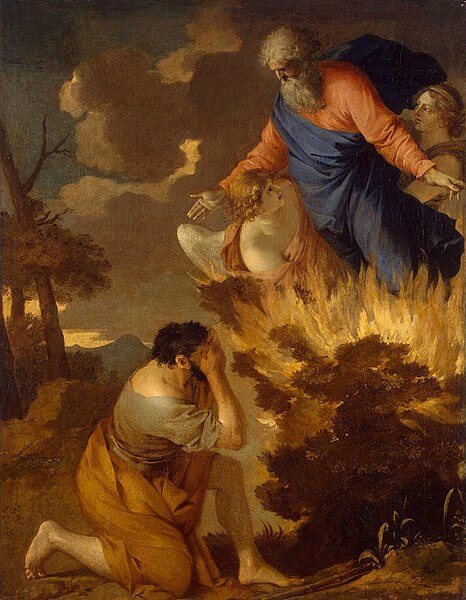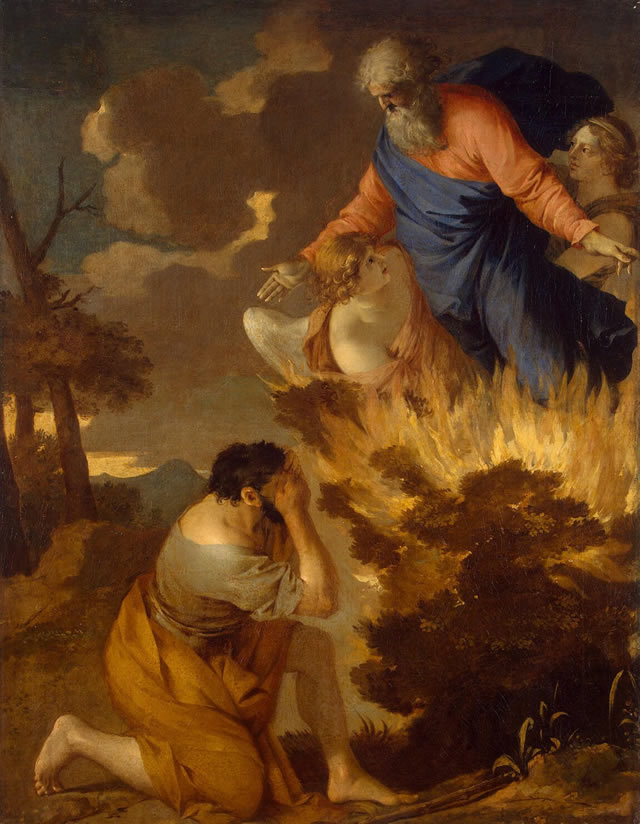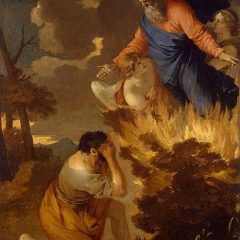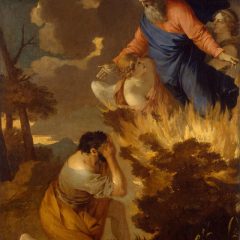burning bush
I Am On Holy Ground

3rd Sunday Of Lent – Year C
Fr. Mark Gatto
Preached: March 23, 2025
Have you ever had an experience like Moses in our first reading today? He approaches a mysterious burning bush, he is told to remove his sandals, for he is on Holy Ground. An experience of the Holy God, an encounter with the God, who simply says, “I am who I am.” Have you ever had a burning bush experience where you recognized that you were on Holy Ground?
As Catholics, the sense of being on Holy Ground should actually be very familiar to us. In our churches, we have the Tabernacle. A vigil light is kept burning near it to remind us of the presence of the Blessed Sacrament. When we enter a church we genuflect to the tabernacle. It is like we are removing our sandals recognizing that in the presence of the Tabernacle we are on Holy Ground.
In the centre of our churches is the Altar. When we cross the Altar we normally bow. For this Altar is where the Sacrifice of the Mass takes place and the Real Presence of Jesus comes into our midst in the consecrated bread and wine. In the Altar we recognize that here we are on Holy Ground.
Also at the Ambo, in the Scriptures, we make special responses and gestures to remind us that before the Bible we are on Holy Ground. Symbolically we remove our sandals like Moses before the burning bush so that we are ready to listen to the Holy God speaking to us through the Scriptures.
Also, when we are gathered with an assembly of believers as we are now, we should recognize that we are on Holy Ground. For Jesus says that where two or three are gathered in his name, he is in their midst. We should recognize the body of Christ here in this mixed group of people gathered to worship. Though we do not remove our sandals, we should recognize that when we are gathered with the church, we are on Holy Ground.
So, as Catholics we should be familiar with the experience of being in the presence of the Holy God, of standing on Holy Ground. The burning bush experience of Moses is a spiritual experience that is also possible for us.
In our Gospel today, Jesus is very clear about our need to repent, saying “unless you repent you will perish as they did.” One way we repent is to symbolically “remove our sandals,” in order to recognize that we are on Holy Ground. Not just in a church, but in each moment and each encounter of our daily lives. Here are some places we need to recognize that we are on Holy Ground.
In our home and with our family. We should treat our home and family as Holy Ground. We speak of the Domestic Church. Imagine what a difference it would we make if we treated our home and family as Holy Ground. Next time at home and with your family, in your heart simply say, “ I am on Holy Ground.”
In fact, each person we meet during the day is an opportunity to encounter the Holy God. What a difference, if we symbolically removed our sandals before each person we met during the day. Would it not change the way we speak to that person, the way we listen to that person, the way we treat that person? Next person you are about to meet, in your heart simply say, “I am on Holy Ground.”
I have often been with people as they were approaching their death. Some ask me if this is difficult. I guess in a certain way it is difficult. But, when we think about it, being with someone as they approach their death, is like being on Holy Ground. The final moments before death is truly a holy moment, as someone comes to the end of this life and moves on to the full encounter with the living God.
Next time you are with a family member or friend who is nearing death, pray silently saying, “I am on Holy Ground.” Also when we are with someone who is grieving, this too is Holy Ground. When you are with someone grieving and do not know what to say or do, simply say in your heart, “I am on Holy Ground.”
A final moment of Holy Ground I want to mention, is when we are sharing a meal with family or friends. We often say Grace to help us recognize the holiness of a shared meal. But, next time you are sharing a meal with family or friends, say simply and quietly in your heart, “I am on Holy Ground.”
During this Lent, embrace the call of Jesus to repent. One way is to recognize when you are on Holy Ground. Make that simple prayer often, “I am on Holy Ground.” Symbolically remove your sandals like Moses before the burning bush. Before each encounter with a person, at home with family, when sharing meals, when here to celebrate the Mass, when getting ready to pray or read the Scriptures, when the spring sun is shining on your face, simply pray in your heart, “I am on Holy Ground.” Then pay attention to how that changes how you are in those moments.
Patience And Mercy – The Way Of Our God

Third Sunday Of Lent – Year C
Fr. Mark Gatto
March 24, 2019
In New Zealand, a white supremacist terrorist attacked two mosques killing about 50 Muslims. Like most terrorists, he probably thought that he was doing a good thing. That this use of force and violence was justified in his mind.
The thinking that justified this extreme use of force and violence is unfortunately often embraced by leaders in our countries, often embraced by people within families. The idea that force and violence are justified in certain circumstances. But, we need to be clear that this can never be seen as the will of God. Force and violence are not the way of our God.
God is a gardener. Well, Jesus uses a parable in which God is like a gardener. There is a fig tree that has not been producing figs. So, the owner wants to cut it out and not waste the soil on it. But, the gardener says to give it one more year and he will dig around it, and put manure on it, and give it another chance. When Jesus says God is like a gardener, what is he saying about God?
God is patient. God is merciful. God’s gentle mercy and incredible patience. We human beings are not so patient with one another, we are very quick to judge, to condemn, to punish, to want to get rid of those who fail or oppose us. But, God is patient and full of mercy. God offers chance upon chance, offers mercy upon mercy.
We also heard in our First Reading today, the encounter of Moses with the Holy One in the burn-ing bush. Moses removes the sandals from his feet out of reverence for the Holy Ground he was on in the presence of the Holy One. After Jesus, we recognize each human being is Holy Ground. The Holy One, God the Creator, is present in each human being.
Therefore, we are to encounter each human being as though we were on Holy Ground, in the presence of the Holy One. As Moses encountered God in that burning bush, we are to encounter God in each person we meet.
As Catholics, when we enter a church, we look for the Tabernacle, and we genuflect as a sign of reverence. Before the Tabernacle we are on Holy Ground, in the presence of the Holy One in the Real Presence of Jesus in the Blessed Sacrament.
Imagine if we Catholics genuflected before each person we met. If like Moses we removed our shoes as a sign of being in the presence of the Holy One. It is not practical for us to genuflect before each person we meet as we do to the Tabernacle. But, imagine if in our heart we genuflected to reflect reverence in the presence of the Holy One. How would we treat one another?
God is like a gardener who gives us another chance, chance upon chance. Jesus reveals God as the God of mercy upon mercy. The use of force and violence does not reflect the way of God.
Like Moses removed his sandals on the Holy Ground in the presence of the Holy One in the bur-ing bush. Catholics genuflect on the Holy Ground in the real presence of the Blessed Sacrament in the Tabernacle.
Today, we need to genuflect in the presence of each person we meet, for each person is Holy Ground where we can encounter the Holy One. It is not force and violence that is needed, it is an attitude of mercy upon mercy.



